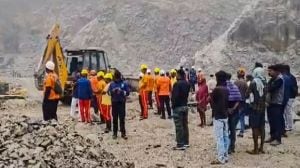US not negotiating Indo-Pak relations: Holbrooke
US envoy for Afghanistan and Pakistan Richard Holbrooke said that US has no intention of trying to push the Indian govt into resuming talks with Pakistan.
US underlines India8217;s key role for success of Af-Pak policy
New Delhi
As it begins implementation of its new strategy on Afghanistan and Pakistan,the US on Wednesday underlined the critical role of India in the success of the policy as there was a 8220;common threat8221;.
US Special Envoy Richard Holbrooke,who held talks with Foreign Secretary Shivshankar Menon and National Security Adviser M K Narayanan,underlined that he was not visiting the region to 8220;negotiate8221; between India and Pakistan.
8220;The answer is no,8221; Holbrooke said at a press conference here when asked whether he had asked his Indian interlocutors to resume talks with Pakistan.
8220;Let me just be clear on my one word answer. We did not come here to ask the Indians to do anything. We came here to inform about our trips to Afghanistan and Pakistan as we always do and to get their views. We did not come here with any requests,8221; said Holbrooke,while addressing the press along with US Chairman of Joint Chiefs of Staff Admiral Mike Mullen.
Holbrooke and Mullen emphasised that their visit here was in connection with the new strategy on Afghanistan and Pakistan,which the US has just started to implement.
8220;We cannot settle issues like Afghanistan and many other issues without India8217;s full involvement and its own expression of views,8221; said Holbrooke while pointing out that he had come to 8220;listen8221; to Indian views and that his discussions with Indian officials were 8220;terrific8221;.
Contending that 8220;priorities8221; of both India and the US in Afghanistan are the same,the Special Envoy on Afghanistan and Pakistan said 8220;coordination8221;,however,was missing and that his visit here along with Mullen was aimed at accelerating that.
8220;Everyone in this part of the world should recognise that for the first time since Partition,India,Pakistan and the US face a common threat and a common challenge and we have a common task,8221; he said.
Acknowledging that there was 8220;history8221; between India and Pakistan as well as between Pakistan and Afghanistan,he said 8220;but now as we face a common threat,we must work together.8221;
He said the US is 8220;working intensively with our friends in Pakistan to achieve a common goal. That is what we are doing. We know it8217;s going to be difficult but the national security interests of all three countries are clearly at stake.8221; Noting that Pakistan is at the centre of the common fight,Holbrooke said,8221;What happens in Afghanistan is profoundly affected by what happens in Pakistan and the two issues are deeply inter-related.8221;
He voiced concern over the peace deal between government and Taliban in Swat region of Pakistan and said the worries had been 8220;further raised8221; after terror attacks on Sri Lankan cricket team and police training centre in Lahore.
8220;What has happened in Swat has stunned many people in Pakistan,8221; the Special Envoy said,adding 8220;everyone in this part of the world should recognise what8217;s happening.8221;
Holbrooke said during his visit to Pakistan he had met some people from Swat to 8220;learn more8221; about the peace deal and observed that 8220;it was a difficult and touching meeting8221;.
He described Baitullah Mehsud,chief of Pakistani Taliban as 8220;a terrible man8221; and 8220;a great danger to Pakistan,Afghanistan 8230; He Mehsud is as bad as any bad actor in a very dangerous region.8221;
Asked about his assessment on whether the ISI was ready to sever its ties with terrorists,Mullen said that one of the priority issues of his visits to Pakistan over the last one year has been the 8220;focus on intelligence activities and doing that in a constructive way8221;.
He said the focus continues to be that but refused to go into the details of the discussions that were going on.
Referring to his visit along with Mullen to Islamabad yesterday,Holbrooke said 8220;we were not there,I repeat,not there to negotiate Pakistani-Indian relations 8230; I should make it clear.8221;
He said their stopover in New Delhi was to 8220;inform and consult8221; the Indian government on the US strategy on Afghanistan and Pakistan.
Mullen said the objective of the visit here was to 8220;understand problems through your eyes8221; as the 8220;leadership8221; of India is very critical. He said the US would seek to consult India in every engagement 8220;to listen and learn8221;.
Emphasising that the new US strategy on Afghanistan involves joint military-civil effort,Holbrooke said Washington was keen to understand about India8217;s 8220;impressive8221; developmental activities in the trouble-torn nation.
He hailed developmental activities being undertaken by India in Afghanistan which covers areas like road building,construction of Afghan Parliament and agriculture and said these run parallel to that of the US.
He said further talks will be held between India and the US in this regard in the context of implementation of the new strategy on Afghanistan and Pakistan unveiled by President Barack Obama last month.
Holbrooke said the previous US administrations of Bill Clinton and George W Bush had worked very hard in development and improvement of Indo-US relations which was bearing positive results.
Those discussions focused on bilateral areas like trade,investment and nuclear issue,he said.
8220;In entire process,we never really had sufficient talks with India on regional and global strategic issues and that was the missing factor. And that is what Admiral Mullen and I have come here to accelerate,8221; he said.
Mullen said India is a 8220;vital leader8221; in the region and is playing a critical role in many positive ways. 8220;We recognise that.8221;
The top US military official underlined that regional challenges of South Asia need regional solutions.
8220;The challenges we have in Afghanistan,strategy in Afghanistan and Pakistan,military power alone is useless. It is civilian-military team that is so important,good governance along with security,8221; he said.
- 01
- 02
- 03
- 04
- 05






























